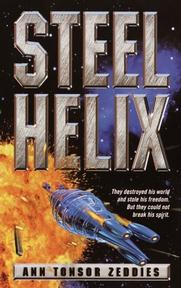 |

Steel Helix
by Ann Tonsor Zeddies
(Del Rey, $6.99, 362 pages, paperback; 2003.)
Usually when a novel is described as a rollercoaster ride, one expects
an exhilarating experience with twists and turns aplenty. I don't mean
that this time -- for the most part. See, when reading Steel Helix
I found myself going through so many ups and downs that I started to
get frustrated. Like many a co-dependent, though, the ups were so high
that they made me think I should keep going, that there might not be
any more downs, that things would be different this next chapter ...
OK, I also  kept
reading because I was writing a review, but that's besides the point. kept
reading because I was writing a review, but that's besides the point.
Wait! Before you cross this book off, and more importantly before you
cross Ann Tonsor Zeddies off, read the rest of this review. Here is
an author to keep watching.
I must start at the beginning -- the real beginning: the cover.
We are given a stunning explosion with an odd-looking spacecraft soaring
away, flames nipping at its heels. This isn't the worst cover in the
world, but it did nothing to sell the book to me. When I looked at it,
I thought, "Gee, how generic." To make matters worse, the tag line reads:
"They destroyed his world and stole his freedom. But they could not
break his spirit." If I'd seen this in a bookstore I'd have just kept
going.
But I started reading. And -- surprise! -- by page 10 I found myself
sucked into this old-style space adventure. It follows Piers Rameau,
one of the best geneticists in the universe and a prisoner of a faction
known as Original Man. The faction is composed entirely of clones and
genetically altered/enhanced versions of the clones. Throughout the
novel, Rameau seeks revenge for the destruction of his home (and, despite
the cover tag line, they do break his spirit at one point, but -- whew!
-- he regains it later) and tries several times to ruin Original Man.
In the end, of course, he learns that his enemy is not all evil and
finds a common ground to save both himself and those he now cares about.
Zeddies does a remarkable job in creating the various nuances of Original
Man life. They behave partly like social insects, partly like military
totalitarians, partly like human beings. Throughout, we learn much about
these clones ... and this is where the novel starts to have problems.
Zeddies has made the classic sf-writing mistake. She has overloaded
the novel with every detail she worked so hard to invent. Some of her
detail is good and paints a clear enough image that the reader can fill
in the rest. If only she would have stopped. Instead, she pushes the
reader through these massive descriptions that do nothing but slow the
story and take away from the initial image.
And then, as I felt my eyelids getting heavier ... BOOM! The story
jolts into life again. We learn that the clones were put through a process
to speed their growth and training. They are, ultimately, 10-year-old
adults. The discovery explains a lot of earlier behaviours that had
bothered me. In fact, if Zeddies had given me a hint in the beginning
that something wasn't right, I would have been paying closer attention
to all her details. Not that I would necessarily have figured it out,
but it would have built a greater tension than I experienced during
the first half of the book.
A little boy (or is he a clone?) is introduced in a manner very similar
to the little girl in the movie Aliens (complete with predatory
alien), and I started cringing. However, Zeddies deftly manoeuvres the
story and characters to make me buy into it all. By the time that Rameau
is translating classic myths and legends into a form these clones can
comprehend, I was back to enjoying every word.
The climactic moments, thankfully, worked with all the proper thrills.
The pacing rips along at the end, making me wish the first half had
been written with the same vitality. Rameau has a lot of depth to his
character, but much of it is hidden from the reader until the second
part of the book. It's a writing gamble that didn't pay off.
So, Steel Helix ... what can I say? This was the great book
that almost was. Or it's a good book that left me wanting. Should you
read it? Well, make no mistake, Ann Tonsor Zeddies is a talented writer.
Despite all the minuses I've picked upon here, the plusses in this story
are strong, and I expect good things from her in the future.

Review by Stuart Jaffe.
|
 |



